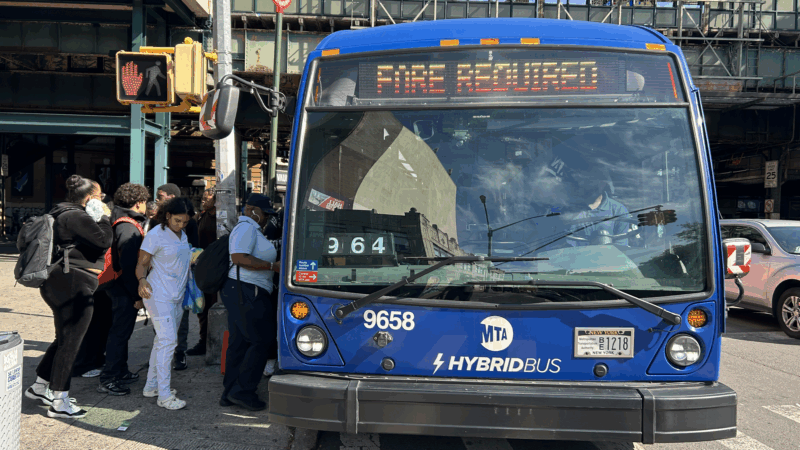Should the bus be free? Transit advocates are divided
NEW YORK — If you ask people in the Bronx what they think about making the bus free, you get a lot of versions of yes.
“Why not? Yes, it definitely should,” said Melanie Marrero as she waited for the Bx18 bus with her two young children. “Because, as you see, it’s like almost three dollars, and it’s going to go up.”
Today the bus costs $2.90 per ride for adults. For a while last year, this bus line was free for everyone — thanks to a temporary pilot program supported by an obscure state assemblyman from Queens named Zohran Mamdani, who made it part of his dark-horse candidacy for mayor.
“As mayor, I’ll make every bus fast and free,” Mamdani pledged in this video. That message helped propel him to a resounding win in the Democratic primary with a campaign focused on affordability, and could come up again Thursday night when the mayoral candidates debate ahead of next month’s general election.
Other cities have made buses free, but their track record is mixed. And even transit advocates — people who definitely love buses, and want more people to ride them — are divided on whether making buses free is the best way to do it.
“We want people to have the right to the city. We want people to experience that mobility and that ability to get around,” said Charles Komanoff, an economist and longtime transit advocate in New York who supports Mamdani’s plan for free buses.
That plan would help make those buses faster too, Komanoff says, because passengers could board through all doors at once instead of waiting in line to pay.
“When you make the buses faster, that also incentivizes people to ride the bus who might otherwise now be taking an Uber, taking somebody’s car, you know, taking a taxi or whatever,” Komanoff said in an interview.

But the plan has skeptics, too.
“It’s not the first thing I would do,” said Eric Goldwyn, the program director at the Marron Institute of Urban Management at New York University.
Goldwyn’s research suggests that what people really want are buses that come more often and are more reliable, and that cost is not the top issue. So, if you really want to get people out of taxis and cars, Goldwyn argues, it’s better to spend money on more frequent service or infrastructure improvements like dedicated lanes.
“The way you get people on the bus is by making it faster, more frequent and more reliable,” he said. “That’s where I would focus my energy before I would focus on free.”
Buses are not cheap to operate. The fare box is just one source of funds, and it’s rarely the biggest.
Some cities have found other ways to pay. Boston used federal money to make three popular bus lines free, while Alexandria, Va., and Olympia, Wash., stopped collecting fares altogether.
Then there’s Kansas City. The regional transit authority eliminated fares in 2020, but it did not go exactly as local leaders had hoped.
“We just never found a sustainable funding source to replace the $10 million a year out of the fare box,” said Eric Bunch, a city councilman in Kansas City, Mo., and a member of the Kansas City Area Transportation Authority.
Bunch says ridership stayed stable at a time when most cities saw steep drops. There were also concerns about security, with bus drivers complaining that they encountered more homeless people on board, though it’s not clear if other riders were in any added danger.
But the biggest issue, Bunch says, was money. “The problem in most American cities is that we don’t adequately fund public transit. That’s the bottom line,” he said.
Kansas City’s transit authority plans to begin charging fares again in the spring. This may be a cautionary tale for New York, which has by far the largest bus ridership of any U.S. city.
But mayoral candidate Zohran Mamdani is undaunted. Last week, he rode one of the city’s slowest lines to a press conference to make his point.
“It can’t just be making it free alone. You have to be making it free while actually making the infrastructure for it to be fast,” he told reporters aboard an M57 bus in Manhattan.
That’s something City Hall could prioritize. It’s just that New York City hasn’t had a mayor who cares much about buses, Mamdani said.
Homeland Security suspends TSA PreCheck and Global Entry airport security programs
The U.S. Department of Homeland Security is suspending the TSA PreCheck and Global Entry airport security programs as a partial government shutdown continues.
FCC calls for more ‘patriotic, pro-America’ programming in runup to 250th anniversary
The "Pledge America Campaign" urges broadcasters to focus on programming that highlights "the historic accomplishments of this great nation from our founding through the Trump Administration today."
NASA’s Artemis II lunar mission may not launch in March after all
NASA says an "interrupted flow" of helium to the rocket system could require a rollback to the Vehicle Assembly Building. If it happens, NASA says the launch to the moon would be delayed until April.
Mississippi health system shuts down clinics statewide after ransomware attack
The attack was launched on Thursday and prompted hospital officials to close all of its 35 clinics across the state.
Blizzard conditions and high winds forecast for NYC, East coast
The winter storm is expected to bring blizzard conditions and possibly up to 2 feet of snow in New York City.
Norway’s Johannes Klæbo is new Winter Olympics king
Johannes Klaebo won all six cross-country skiing events at this year's Winter Olympics, the surpassing Eric Heiden's five golds in 1980.







